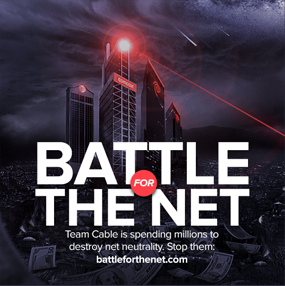 In 1995, I created my first web site. It was not much to look at, but the experience was empowering. I had my own little spot on the Internet, and I could do anything I wanted with it. From its earliest days, the Internet was built to be open. My little web site was entitled to just as much availability and access as CNN’s, or Google’s, or the White House’s. Of course there are money factors involved; I can’t afford as powerful a server or as much bandwidth as these large and well-funded organizations. But if a billion people wanted to go look at my stupid little site, and I was willing to beef-up my infrastructure to handle it, nobody could stop them.
In 1995, I created my first web site. It was not much to look at, but the experience was empowering. I had my own little spot on the Internet, and I could do anything I wanted with it. From its earliest days, the Internet was built to be open. My little web site was entitled to just as much availability and access as CNN’s, or Google’s, or the White House’s. Of course there are money factors involved; I can’t afford as powerful a server or as much bandwidth as these large and well-funded organizations. But if a billion people wanted to go look at my stupid little site, and I was willing to beef-up my infrastructure to handle it, nobody could stop them.
This principle is the principle of ‘Net Neutrality.’ Under this principle, nobody has the right to preference some content at the expense of other content.
Today, Internet service providers like Verizon and Comcast want to create a tiered Internet . . . one where sites like mine get slowed-down in favor of other sites that can afford to pay for preferential treatment. This system would create a large barrier for new sites, especially those that require a lot of bandwidth. Sure, YouTube and Netflix can probably afford to pay for speedy access into your home, but what about the next YouTube and the next Netflix? How will scrappy start-ups—those who don’t have billions of dollars to spend on ISP kick-backs—be able to compete with the incumbent power-players? And if Verizon and Comcast get to decide which sites are fast and which sites are slow, what will stop them from deciding to limit or block access to their competitors as the legacy cable businesses begin to lose money?
Can you imagine if we had allowed phone companies to block Internet access over their phone lines back in the 1990s? Can you imagine if we allowed power companies to restrict what devices and appliances you can use in your home? That is the sort of control that Verizon, Comcast, and others want to have over your Internet connection.
I am proud to join with countless companies and individuals all across the Internet in the Battle for the Net. This is one of the rare cases where there is a real need for federal intervention (under the authority to regulate interstate and international commerce). Congress must act to protect Net Neutrality and ensure that the Internet remains a vibrant, open, and accessible incubator for the ideas and businesses that will drive our economy in the future. Please join the campaign. Contact the Federal Communications Commission and your representatives in Congress and let them know that you like the Internet, and you would like to keep it.
The views expressed in this post are mine and mine alone. They do not necessarily reflect the views of my employer, Web.com.
